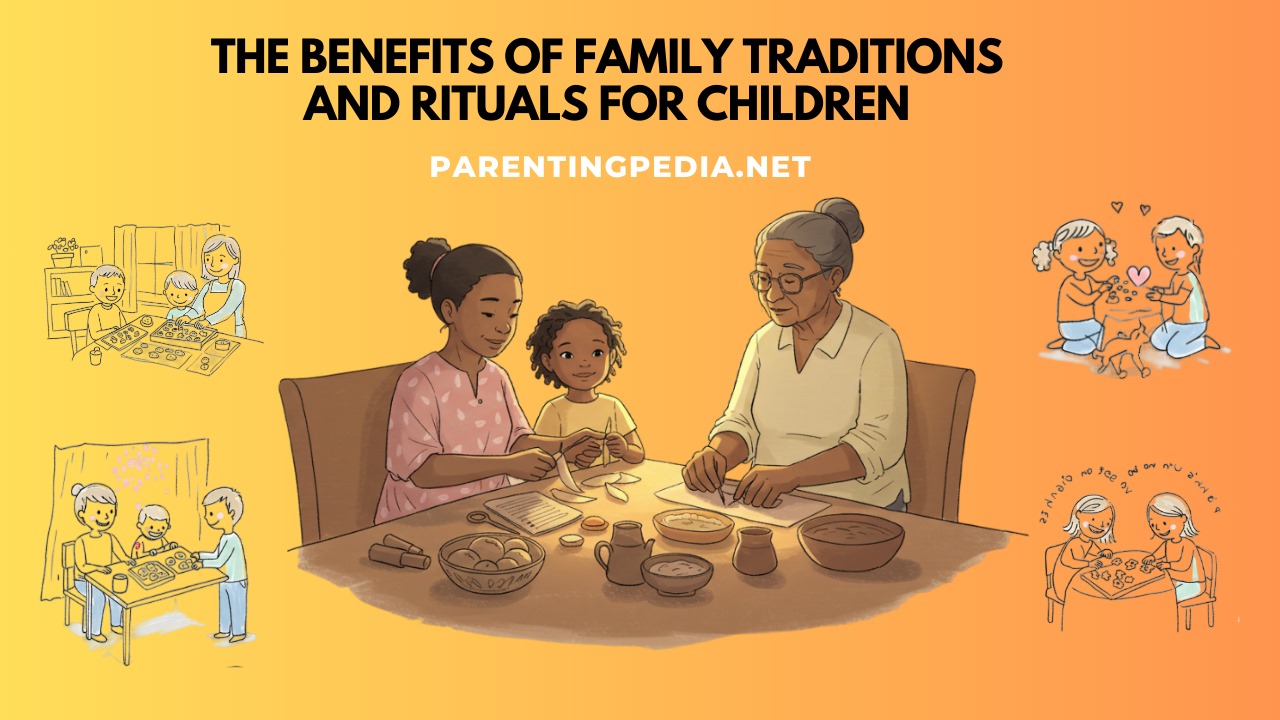Family traditions and rituals play a crucial role in shaping a child’s development, providing a sense of identity, security, and emotional connection. These customs whether followed daily or seasonal create a structured environment where children can thrive. In today’s fast-paced world, maintaining traditions can help instill values, strengthen family bonds, and offer stability amid change. This article explores the benefits of family traditions and rituals and how they contribute to children’s emotional, social and cognitive growth.
What Are Family Traditions And Rituals?
Family traditions and rituals are repeated practices or activities that hold significance within a family. They can be as simple as bedtime stories or as elaborate as annual holiday celebrations. Each of these rituals strengthens the family structure and reinforces a sense of belonging in children. These traditions can be:
Daily rituals – Like family dinners and morning routines.
Weekly traditions – Like game nights and movie nights with children
Annual traditions – Like birthday celebrations and holiday traditions
Other rituals – Such as first day of school traditions, graduation celebrations etc.
Emotional Benefits Of Family Traditions
a. Providing a Sense of Security – Children thrive in environments where they feel secure. Knowing that certain family rituals will always be there, such as Sunday dinners or bedtime routines, gives children a comforting sense of stability.
b. Strengthening Family Bonds – Engaging in traditions creates shared experiences that strengthen the parent-child relationship. Spending time together promotes communication, love and support in family.
c. Reducing Stress And Anxiety – In times of uncertainty or change, familiar traditions offer a grounding effect. Whether dealing with school transitions or major life events, children find comfort in the predictability of family rituals.
d. Encouraging Emotional Expression – Family traditions provide opportunities for children to express emotions in a safe space. Rituals like sharing “highs and lows” during dinner help children develop emotional intelligence.
Social Benefits Of Family Traditions
a. Teaching Social Skills and Values – Traditions often involve interactions with extended family and friends, teaching children essential social skills like cooperation, empathy, and communication. Rituals such as giving thanks during meals instill gratitude and appreciation in children.
b. Strengthening Cultural and Family Identity – Through traditions, children connect with their heritage and learn family history. Celebrating cultural festivals, storytelling, or cooking traditional meals helps children develop a sense of identity and belonging.
Also Read: Finding Joy In Parenting Despite Challenges
c. Encouraging Generational Bonding – Many traditions involve grandparents, aunts, uncles, and cousins, promoting intergenerational relationships. These interactions help children understand family lineage and learn valuable life lessons.
d. Developing a Sense of Responsibility – Participating in family rituals teaches children responsibility. Simple traditions like setting the table for family dinner or helping with holiday decorations promotes a sense of belonging in children and provide opportunities to learn about traditions and cultural significance while actively participating in the festive atmosphere.
Cognitive And Developmental Benefits Of Family Traditions And Rituals
a. Enhancing Language And Communication Skills – Rituals such as storytelling, reading before bed, or discussing daily experiences at dinner encourage language development and communication skills.
b. Boosting Creativity And Problem-Solving – Many traditions involve creative elements like crafting during festivals, baking together, or planning family outings. These activities enhance problem solving abilities and imaginative thinking in children.
c. Supporting Academic Success – Structured routines like regular study sessions or reading traditions create disciplined habits that contribute to academic achievement. A child who grows up with a consistent bedtime story routine is more likely to develop strong literacy skills in comparison to other children.
d. Teaching Patience And Delayed Gratification – Many traditions such as waiting for a birthday gift or participating in holiday preparations, teach children the value of patience and delayed gratification which are important skills for future success in children.
Psychological And Long-Term Benefits Of Family Traditions
a. Building Self-Esteem And Confidence – When children are actively involved in traditions, they feel valued and significant. Whether it is helping to prepare a family meal or leading a holiday tradition, these roles boost their confidence.
b. Creating Positive Childhood Memories – Family traditions shape a child’s early memories. Happy moments created through traditions form a positive foundation that children carry into adulthood, influencing their well-being.
c. Strengthening Resilience – Life comes with challenges, but having strong family traditions provides children with coping mechanisms. Knowing they have family support helps them navigate difficulties with resilience.
d. Passing Down Core Family Values – Family traditions serve as a way to pass down moral and ethical values. Whether it is showing kindness through holiday giving or emphasizing teamwork through shared responsibilities, traditions reinforce core values in a natural way in children.

How To Create And Maintain Meaningful Family Traditions
a. Keep It Simple And Consistent – Traditions don’t have to be elaborate, they just need to be meaningful. Even a simple ritual like a family walk on Sundays can be impactful for children if practiced consistently.
b. Adapt Traditions To Changing Lifestyles – As children grow, family traditions should evolve to remain relevant for them. A bedtime story tradition may turn into a family book club as kids get older.
c. Encourage Active Participation – Let children have a role in planning and shaping family traditions. Whether it is choosing a theme for a family movie night or cooking a favorite meal, involvement of children make traditions more meaningful.
d. Balance Tradition With Spontaneity – While consistency is important, adding an element of surprise such as a spontaneous family trip or an unexpected treat keep traditions exciting for children.
e. Celebrate Small Moments – Not all traditions have to be tied to major holidays. Everyday rituals with children like greeting each other warmly after school or sharing a joke at breakfast create small yet significant bonds with them.
The Impact Of Family Traditions On Future Generations
Children who grow up with strong family traditions are more likely to continue them in their own families. These rituals shape their understanding of love, support, and togetherness. Studies show that adults who experienced rich family traditions as children tend to have stronger emotional resilience and healthier relationships in adulthood. By preserving traditions, parents are passing down more than just rituals to children, they are passing down a sense of belonging, identity, and love that go beyond generations.
For more helpful parenting tips, visit-loveyoumommy
Conclusion
Family traditions and rituals play a fundamental role in a children’s emotional, social and cognitive development. They provide a sense of security, strengthen relationships and create lifelong memories for them. Whether simple or elaborate, traditions promote a nurturing environment that helps children grow into confident, well-rounded individuals. As families continue to evolve, maintaining meaningful traditions ensures that children always have a strong foundation of love, support, and connection.
FAQ
Why are rituals important for children?
Rituals provide children with structure, stability, and a sense of belonging. They help build emotional security, strengthen family bonds and instill values in children. Daily routines, cultural traditions, and celebratory rituals promote discipline, enhance social skills and create cherished memories. These practices also nurture emotional resilience, making children feel loved, understood, and connected to their family.
What is the importance of family traditions?
Family traditions strengthen bonds, create lasting memories and provide a sense of identity. They instill values, promote emotional security and connect generations. Traditions offer stability especially during challenging times and enhance appreciation for culture in children. Celebrating rituals together nurtures love, belonging, and togetherness, reinforcing the family’s traditions and rituals in children and deepening relationships across time.
Remember, the greatest reward of parenting lies in watching
your children soar with love and confidence.
Till then keep smiling and be happy

